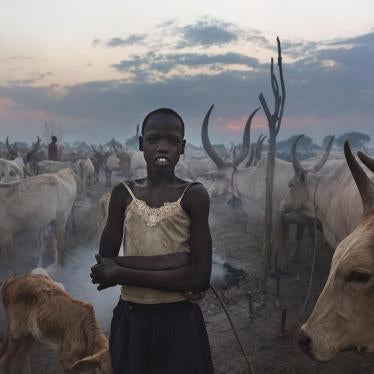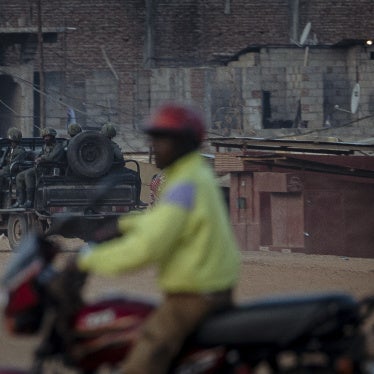(JUBA) -- Helen was in labor for four days. Married and pregnant at 15, she told Human Rights Watch that "the baby wouldn't come out ... I didn't have the strength to push ... It almost killed me."
To be forced into marriage and pregnancy as a child--when your own life has barely begun--is a serious violation of human rights. Far from creating a nurturing and safe space, child marriage is a driver of poor maternal health, violence, poverty, and pain.
Child marriage is a global issue that violates basic rights and negatively shapes the experiences of girls in many regions of the world. The UN estimates that every year, 14 million girls worldwide are married before the age of 18. Child and forced marriage is particularly widespread in South Sudan, where nearly half of women between the ages of 15 and 19 are married - some as young as age 12. On the eve of International Women's Day, Human Rights Watch and colleagues from South Sudanese women's rights groups are launching a new report on child marriage, and the grave consequences of the practice.
The report documents how child marriage frequently disrupts or deprives South Sudanese girls of education altogether, exacerbating huge gender gaps in school enrollment. Only 39 percent of primary school students and 30 percent of secondary school students in South Sudan are female.
Mary K., a girl from Yambio County, told us that her father refused to give her an education: "He said it is a waste of money to educate a girl. He said marriage will bring me respect in the community. Now I have grown up and I know that this is not true. I cannot get work to support my children and I see girls who have some education can get jobs." Girls who are denied access to school because of child marriage have limited opportunities, choices, skills, and future potential to provide for their families. These problems don't end in childhood, but follow girls like Mary for the rest of their lives.
In addition to barriers to education, child brides, like Helen, are at a higher risk of life-threatening complications during pregnancy and childbirth. Statistics prove that younger girls' vulnerability to prolonged labor, obstetric fistula, or maternal death is significantly higher than older women whose bodies are fully developed. South Sudan currently has the highest maternal mortality rate in the world, approximately 2,054 maternal deaths for every 100,000 live births.
Human Rights Watch's message to South Sudanese government officials and international donors is that failure to eradicate this practice will not only negatively impact girls and women, but will also have very real implications for the future social and economic development of the country. Our report exposes how child marriage affects the education, health, and economic progress, not just of women and girls, but also their families and communities.
South Sudan is a new government, established with the support of the international community. Its leaders can and should choose to prioritize legislation that explicitly sets 18 as the minimum age of marriage, implement clear guidelines on how to effectively respond to child marriage cases, and develop a multi-sector national action plan to prevent and address the negative consequences of the practice. With proper implementation, these efforts will go a long way to protect the rights of South Sudanese women and girls.
South Sudan should also move quickly to ratify key international human rights treaties, such as the Convention on the Elimination of All Forms of Discrimination against Women (CEDAW) and the Convention on the Rights and Welfare of the Child (CRC), instruments that will help weave the rights of women and children into the legal fabric of the new country.
As we celebrate International Women's Day on March 8th, governments around the world should honor girls by giving them the tools they need to grow into the healthy, educated, economically independent women they have the potential to be. The government of South Sudan should take the lead by doing everything in its power to combat child marriage--while having the foresight to see that investing in the protection and rights of its girls today will produce dividends for the progress and development of its country's tomorrow.







